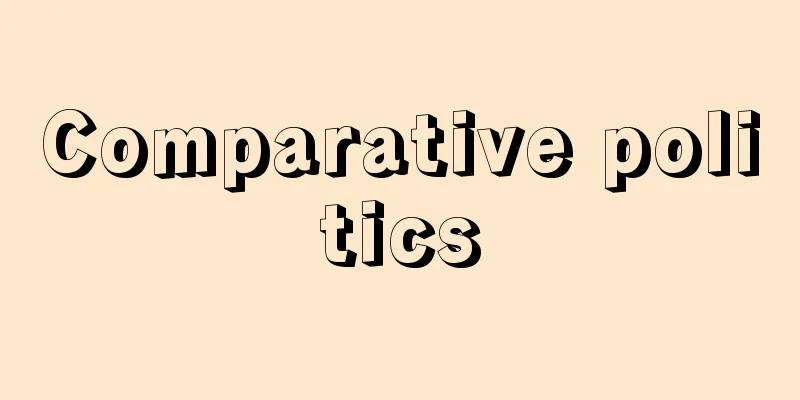Comparative politics

|
Today, comparative politics is a field that aims to analyze the essence of political phenomena through comparative methods and to construct universal theories. For political science, which, like other social sciences, does not have a laboratory, comparison is a valuable tool for identifying the causes of a certain phenomenon. Comparison includes both temporal (historical) and spatial comparison. The comparative perspective has been around for a long time, but until the first half of the 20th century, comparative research was focused on descriptively understanding the political systems of other countries from an institutional perspective. In other words, previous research was focused on adopting systems that were considered more democratic as models, or on arguing that they should be adopted, and was strongly colored by comparative political institutionalism. Until the Second World War, international relations were formed by Western countries, and the subjects of research were limited to Western countries. However, after the war, emerging countries appeared on the international stage, and as they became an indispensable presence in the international community, they inevitably became the subject of research. In particular, during the Cold War, the analysis of emerging countries became an important national policy issue in order to maintain and expand its own camp. However, the traditional institutional theory approach was unable to deal with societies that were completely different from Western society. Therefore, an analytical framework that was not bound by institutions was needed, and the form of comparative politics was established beyond comparative political institutional theory. Due to this development process, comparative politics originally had the meaning of political modernization theory and development theory, but later a trend of respecting the uniqueness of each society emerged, and the direction of comparative politics changed. Currently, it is considered an opportunity to verify in order to refine political theory, and there is no longer a unique field called comparative politics, but it is integrated into political science itself. G. Almond, a well-known comparative political scientist, introduced the theory of political systems based on structural-functional analysis to comparative politics, making a great contribution to the development of this field. His analytical scheme is based on the premise that basic political functions are performed in any society, and comparisons are made from the perspective of what structures are performing these functions. Even in primitive societies, like democracies, functions such as social integration and value distribution are performed, but these functions are not differentiated, one structure performs multiple functions, or the methods of performing them are not institutionalized. Therefore, he focuses on both the functional and structural aspects and makes a substantive comparison. [Hiroaki Otani] "Comparative Politics" by G.K. Roberts, translated by Norihide Okazawa et al. (Introduction to Modern Political Science 1, 1974, Waseda University Press) " "Methods of Comparative Politics" by R.T. Holt and J.E. Turner, translated by Hideo Uchiyama et al. (1976, Keiso Shobo) Source: Shogakukan Encyclopedia Nipponica About Encyclopedia Nipponica Information | Legend |
|
今日における比較政治学とは、比較という手法によって政治現象の本質を分析し、普遍的理論の構築を目ざすものである。他の社会科学と同様に実験室をもたない政治学にとって、比較はある現象の要因を析出するための貴重な手段となる。 比較には、時間的(歴史的)比較と空間的比較の両方が含まれる。比較という視点は古くからあったが、20世紀前半までの比較研究は、制度論的視角から他国の政治制度を記述的に理解するものであった。すなわち、従来の研究は、より民主的と思われる制度をモデルとして採用するため、あるいは採用すべきことを主張するためのものであり、比較政治制度論的色彩が濃かった。 第二次世界大戦に至るまでの世界は欧米諸国によって国際関係が形成されており、研究対象も欧米諸国に限定されていた。しかし、戦後、新興諸国が国際舞台に登場してきたため、国際社会において無視しえない存在となった新興諸国は、必然的に研究対象ともなってきた。ことに、冷戦期におけるアメリカでは、自陣営の維持拡大のために新興国社会の分析が国策上の重要課題となった。しかし、従来の制度論的アプローチでは、西欧社会とはまったく異質な社会を扱うことはできなかった。そこで、制度にとらわれない分析的な枠組みが必要となり、比較政治制度論を脱して比較政治学としての形が整えられていった。このような発展過程のゆえに当初の比較政治学は政治的近代化論や発展論の意味をもっていたが、その後それぞれの社会の独自性を尊重する風潮が生まれ、比較政治学の方向も転換してきた。現在は、政治理論を精緻(せいち)化するための検証の契機として考えられ、比較政治学という固有の分野が存在するのではなく、政治学そのものと一体化している。 著名な比較政治学者であるG・アーモンドは、構造機能分析による政治体系論を比較政治学に導入し、この分野の発展に大いに貢献した。彼の分析図式では、いかなる社会においても基本的な政治機能は遂行されているという前提にたち、それがいかなる構造によって担われているのかという視点から比較する。原始的社会であっても、民主主義国と同様に、社会統合、価値の配分などの機能は遂行されているが、その機能が分化されていなかったり、一つの構造が多機能を遂行していたり、遂行方法が制度化されていなかったりするだけである。そこで、機能と構造の両側面に着目し、実体的な比較をするのである。 [大谷博愛] 『G・K・ロバーツ著、岡沢憲英他訳『比較政治学』(『現代政治学入門講座1』1974・早稲田大学出版部)』▽『R・T・ホルト、J・E・ターナー著、内山秀夫他訳『比較政治の方法』(1976・勁草書房)』 出典 小学館 日本大百科全書(ニッポニカ)日本大百科全書(ニッポニカ)について 情報 | 凡例 |
<<: Comparison length measuring device
Recommend
Network theory - Network theory
A graph is a diagram that consists of a number of ...
Vitamin - Bitamin (English spelling) vitamin
A group of organic substances found in small amou...
Alte Pinakothek
This art museum is located in Munich. Its collecti...
aircraft turbulence
…Nowadays, flight plans for domestic flights with...
Tsukiji Honganji Temple
This temple is located in Tsukiji, Chuo Ward, Tok...
Tsuneaki Kajūji -
Year of death: Ōan 6/Bunchū 2.1.5 (1373.1.29) Year...
Aglaia
…In Latin, they are called Gratiae, and in Englis...
Glücksburg Dynasty - Glücksburg
A Danish royal dynasty since 1863. A branch of the...
Intraocular lenses
Also called an artificial lens, this intraocular ...
Urabe Kanetomo
...These three virtues, honesty, purity, and comp...
International Congress of Orientalists
… For example, the School of Oriental Studies at ...
Indonesian Development Unity Party
...The Masyumi Party had influence in West Java, ...
Salon de la Société des artistes indépendants
...The 1863 Salon was so strict that 3,000 of the...
Bean-flavored tofu - Bean-flavored tofu
…Kudzu starch or potato starch is dissolved in wa...
Itochu General Partnership Company
…Tadabei then expanded into Osaka and Kyoto, open...









